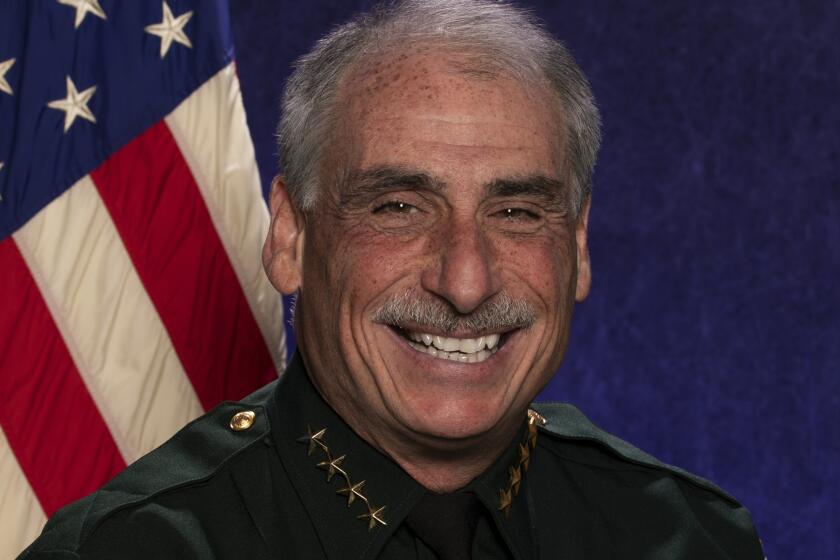House Vote Stiffens Rules on Lobbyists
Hoping to stem the political damage from a spate of embarrassing scandals, the House voted Wednesday to tighten rules governing lobbyists but stopped short of a ban on free trips or gifts for lawmakers.
The close vote on the measure -- 217 to 213, largely along party lines -- reflected criticisms by Democrats that the bill, intended to address Congress’ ethically tarred image, would do little to change the way business is conducted on Capitol Hill.
Much of the legislation is aimed at increasing public disclosure by lobbyists. It would require them to file reports on their activities quarterly instead of twice a year and to provide more information on their political contributions.
Penalties for violating the rules would include, for the first time, the possibility of jail time.
The measure would suspend privately funded travel for House members, but only temporarily while an ethics panel comes up with new regulations for such trips. It would also deny congressional pensions to lawmakers convicted of abusing the public trust and require a public accounting of projects tucked into spending bills, often at the behest of lobbyists.
But the House declined to follow the lead of the Senate, which last month voted to prohibit its members from accepting gifts or meals from lobbyists.
Under election-year pressure to pass an ethics package, the two chambers will next attempt to negotiate a final version.
Proponents hailed Wednesday’s vote as a crucial step toward restoring public confidence in government, which one recent poll showed hovered at 22%. They accused those who voted against the bill of standing in the way of change.
The House bill would help give the public “a Congress that is more responsible and more accountable to the people it represents,” said House Majority Leader John A. Boehner (R-Ohio).
“A vote against this bill is a vote against reform. No way around that,” said Rep. David Dreier (R-San Dimas), chairman of the House Rules Committee and the legislation’s sponsor.
Dreier said the bill’s opponents were “absolutely intent” on stressing what the bill lacked, accusing them of “searching for clouds on a clear day.”
But critics said the measure merely masqueraded as remedy, and that it would do little to curtail the sometimes cozy relationships between lawmakers and lobbyists.
“Our friends on the Republican side of the aisle want to clean up Congress the way teenagers want to clean up their bedrooms ... sweep it under the rug,” said Rep. Brian Baird (D-Wash).
The push for stricter ethics and lobbying rules came in response to several scandals in the last year: Jack Abramoff, a once-powerful GOP influence peddler, pleaded guilty to defrauding clients and conspiring to bribe lawmakers; money laundering charges against House Majority Leader Tom DeLay (R-Texas) led to his recent decision to resign from Congress; former Rep. Randy “Duke” Cunningham (R-Rancho Santa Fe) was sentenced to prison for political corruption and conspiracy.
Four months in the making, the House bill began with talk of a blanket ban on gifts to lawmakers and travel financed by outside groups. Both chambers of Congress prohibit their members from taking trips paid for by lobbyists, but the Abramoff case included allegations that he indirectly picked up the tab for several lavish excursions.
House GOP leaders scaled back the reach of the ethics legislation in the face of objections from many rank-and-file Republicans. These lawmakers defended the usefulness of many fact-finding trips financed by private groups and noted that existing rules limit the value of gifts or meals they can accept from lobbyists to less than $50.
Critics, however, took to calling the legislation “the incredible shrinking bill.”
Even the travel moratorium was shortened by a last-minute amendment, which would suspend privately financed trips until June 15 -- six months earlier than originally proposed. And lawmakers gave themselves an opening to accept such trips if the House Ethics Committee approved them by a two-thirds vote.
Other high-profile concerns were left virtually unaddressed. For instance, the House declined to expand the time ex-members must wait before being allowed to return to Congress to lobby their former colleagues.
The Senate bill would double that waiting period, from one year to two.
The House bill includes a provision aimed at reining in so-called earmarks, the increasingly controversial practice of adding requests to spending bills that solely benefit a particular project or area. The bill would require public disclosure of the sponsors of such requests.
Also, the measure would require House employees -- and encourage House members -- to attend ethics training sessions.
In a provision sparked by the Cunningham case, government-paid pensions would be withdrawn for members who abuse the public trust.
Twenty Republicans voted against the measure and eight Democrats for it. The California delegation broke exactly along party lines, with all 33 Democrats opposing the bill and all 20 Republicans supporting it.
Government watchdog groups denounced the legislation as a sham.
“A vote for this bill is a vote to spray air freshener to mask the stench of corruption instead of cleaning up the underlying problems,” said Anna Aurilio, legislative director of the U.S. Public Interest Research Group.
Fred Wertheimer, president of Democracy 21, called the bill “an outright deceit that does not change the way lobbyists and House members take care of each others’ interests at the expense of the American people.”
More to Read
Sign up for Essential California
The most important California stories and recommendations in your inbox every morning.
You may occasionally receive promotional content from the Los Angeles Times.










